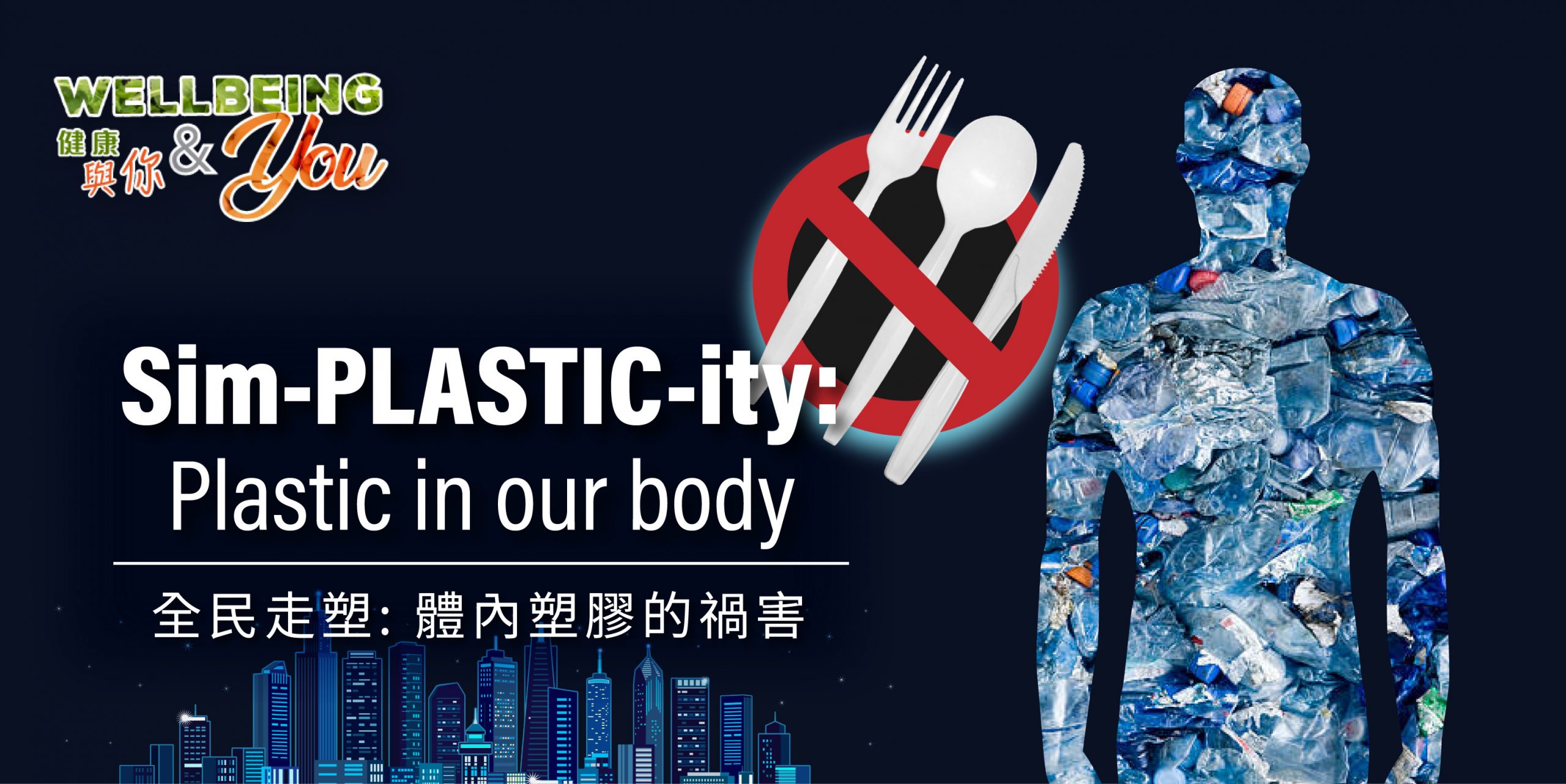[Wellbeing&You] Sim-PLASTIC-ity: Plastic in our body

Heated discussion of plastic-free campaign has been provoked lately. The use of plastic has become so rampant that it is invading our food chains, putting both our health and environment in jeopardy. The chemicals leached out of the plastic (e.g. phthalate, BPA) and the physical micro-plastic entering our body may pose a severe hazard to health in long term. Today we will discuss the sources of plastic in our food chains, how plastic affects our health and dietary recommendations to minimize its health risks.
Plastic in our body analysis |
|||
| Forms of plastic in our body | Physical | Chemical | |
| Microplastic | Plasticizer Phthalate |
Bisphenol-A | |
| Function of addition | Cosmetic and personal care products – face scrub, lipstick and toothpaste | Added to hard plastics to improve the flexibility and durability. | Used to make hard plastic – polycarbonate (PC) and epoxy |
| Source | Food packaging, plastic container (meal box, disposable tableware)
Seafood Tea bag (triangular cone type) Bottled Water |
PVC Plastic : Food wrap
Plastic meal box Plastic tablecloth Plastic withmay have plasticizer added depending on the plastic products |
Plastic packaging materials, kitche and tablewares (e.g. baby bottle, water bottle and meal boxe)
Interior coating of food and beverage cans Thermal receipt paper |
| Health impact | Professor of the institute of Digestive Disease, CUHK pointed out that studies in recent years have shown that micro-plastic ingested from month can pass through the intestinal immune system and enter the blood and lymphatic circulation. If the micro-plastics are absorbed in long term, there might be increase in the risk of vascular sclerosis and even cancer.
The published report of micro-plastic by World Health Organization pointed out that there is no sufficient evidence to prove that micro-plastic will cause harm when they enter the human body. Consumers do not have to worry about it. |
The main effect of phthalate
is its anti-testosterone ability, which affects the reproductive system of the growing children. But the effect of phthalate on human health is still under research.
In animal experiments, phthalate can promote the development of liver tumors in mice, but its carcinogenicity to humans has yet to be confirmed. |
The main health hazard of bisphenol A concerns the reproductive system and endocrine system. At present, the toxicological properties and health hazards of bisphenol A to human body still need more research and evidence to support. |
Dietary Recommendations:
- Eat more high-fibre foods (oats, brown rice, Chinese kale, broccoli, potatoes, mushrooms, oranges, prunes). Part of the plastic pollutants is fat-soluble and will be excreted from liver to faeces via bile. A high fibre diet can help the body to excrete plasticizer.
- Rainbow diet can help fight against the negative health impact of plasticizers. Animal experiments have shown that the toxicity of plasticizers comes from lipid peroxidation. The antioxidant activity of fruits and vegetables can alleviate its negative impact.
- Reduce the intake of high-fat food (e.g. poultry skins, fat layer of roast pork) and organ meat to lower the intake of plastic pollutants stored in fat from food.
- Discard organs of seafood when eating.
- Drink plenty of water. Part of the plasticizer is excreted by kidneys in urine.
- Use glass tableware. Bring your own lunchbox in replacement of disposable tableware to reduce the exposure and intake of plastic pollutants.
- Eat more fresh food and avoid any unnecessary purchase of pre-packaged food.
- Wash your hands before eating (especially children) to reduce the transfer of plasticizer from toys to food.
- Avoid adding hot water/liquid into plastic bottle/ baby bottle.
- Heat the food after taking it out of the can. Don’t cook food in the can.
Ref: Centre of Food Safety, Institute of Digestive Disease, PMID: 29421168, Taiwan Chang Gung Memorial Hospital International Medical Centre, Taiwan Food and Drug Administration, World Health Organization, World Wildlife Fund

